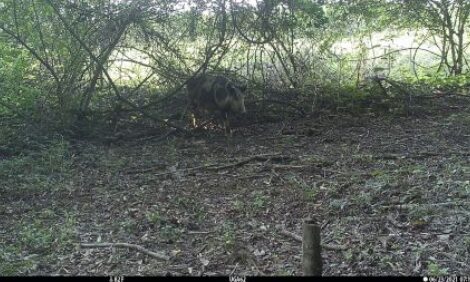



The truth about Ag-gag laws: why the focus should shift to gaining consumer trust
Farm protection bills, so-called "Ag Gag" laws, put in place to protect farms, are being re-examined across the United States. If the laws are overturned, animal rights activists may return to the farms under false pretences to try to expose animal abuse, writes Rachel Lane.With wind-chill below -20 degrees C in some places in the US, farmers are checking that waterlines don’t freeze, heaters are operating, and that pigs are protected with extra bedding from frigid winds. Every day they get up early to care for their livestock. With temperatures below zero across the US, part of that care includes sealing up the sides of trailers when the pigs will be transported.
Most people do not know what is normal on a farm or what it takes to care for the animals. A decade ago, some animal rights activists tried to expose farming practices. Some of the videos made during that time were edited to show farming in the worst light possible while other videos failed to explain what was actually being shown.
On pig farms, much of the attention was focused on gestation or farrowing crates, which are used on some of the larger farmers to hold the sows in individual units to limit fighting and protect the piglets from the mothers rolling on them. The crates are small areas and the adult pigs have limited ability to move, to forage and bed down.
The term “Ag Gag” became popular for any law introduced to protect farms and ranches from “sensational and misleading tactics of animal rights extremists”, says Hannah Thompson-Weeman, vice president of communications at Animal Agriculture Alliance.
Agriculture is protected closely by the government because it is a national security issue, explains Thompson-Weeman. The first farm protection law was put into place in the 1990s, but many states tried to get laws passed in 2000 to protect farmers from animal rights advocates.
Thompson-Weeman says the laws are not to stifle legitimate reporting, as is implied by the name and animal rights organisations. Many of the laws that have been passed require immediate reporting to law enforcement if animal abuse is seen. Any videos of animal abuse should be turned over to authorities rather than released to media outlets.
“Once a farm protection bill is passed in a certain state, the amount of animal rights extremist activity drastically decreases which helps to ensure animal health and well-being, worker safety and food safety by making sure anyone who is employed on a farm is there with the sole intention of providing care to animals”, she said.
Chris Holbein, public policy director in the Humane Society of the United States Animal Protection campaign, said whistle-blowing and undercover investigations are common practices in other industries. In farming, it is a way to hold the handlers of livestock accountable for how the animals are treated.
Many of the farmers the HSUS work with were outraged that the response of big agriculture lobbyists was not to fix the animal welfare concerns but to punish the whistleblowers, he says. It was a short-sighted strategy to stop reports rather than trying to earn back the trust of the American public.
Between 2011 and 2012, many state agriculture industries pushed to have laws passed to stop animal rights workers. Some of the bills were defeated. Others passed and are now being reviewed. Idaho's law was overturned in 2015 and Utah’s law was overturned in 2015 for violating the first amendment - freedom of speech. Iowa and Wyoming are currently being challenged for the same violation.
Holbein thinks the Iowa law should be struck down entirely because 'it’s bad for animals, bad for consumers and bad for farmers'.
“We’re working with our allies that are trying to raise animals in a responsible manner”, he says.
The gestation crates on pig farms are there to limit handling of the pigs, he said, but there has been no proven need for the crates, to keep the animals unable to move and isolated.
“The best long-term strategy is to get rid of these cruel devices all together instead of stopping people from reporting on them”, he says.
The laws were put in place when farmers became concerned that people were coming onto the farms under false pretences, lying on resumes to get access to the animals. There were concerns about the safety of the animals, the safety of the people who didn’t know how to handle the animals, and for the farm, said Kristine A. Tidgren, assistant director for the Center for Agricultural Law and Taxation for Iowa State University.
The producers viewed the animal rights activists as people intent on doing harm to their farms.
It created tension between the property owners, the consumers who wanted to see how the food was produced, the people who wanted to legitimately investigate what was happening in the animal production world and people who wanted to shock others into no longer consuming meat products.
Tidgren said the challenges to the laws were not unexpected, but Iowa’s law is different than the laws in other states. In Iowa, the law bans people from going onto farms under false pretences, which is essentially trespassing. It does not give direction on what can and cannot be done once the person is on the farm: it doesn’t prevent someone from taking video or photographs.
She said she has seen a change in the industry to keep consumers informed about how food is produced, but she doesn’t think it is a result of the videos made or the laws passed. In the last 30 years, consumers have become more interested in where the food comes from and how it is produced. The industry has responded to that interest by making more information available.
Farmers are using technology to share information with the public through blogs, videos they make on the farms, and social media accounts.
“Food production isn’t pretty. The way that meat is made is not pretty”, Tidgren says.
She said it could take a year or more for the lawsuits to be finalised. So far, Utah and Idaho legislators have not moved to make new laws.
Farmers want to know who they’re employing on the farms. Employees need training to handle the animals and be trusted with the animals’ care, said Allison Fiscus, executive director, promotions and communications director for the Utah Pork Producers. The farmers in the Utah Pork Producers work hard to be aware of how the pigs are raised and who they employ. They are quick to stop any bad behaviours and protect the animals.
“It’s their livelihood. If there’s a problem, they wouldn’t be able to feed their families”, Fiscus says.
The Pork Checkoff “We Care Initiative” has been connected with the pork industry in Utah for years, she said. Farmers have always made animal welfare, animal safety, and employee safety a priority.
“They don’t want anyone trespassing on the farm for biosecurity reasons. They don’t want anyone to get hurt. Animals can be big. Grown pigs are big and nobody wants someone who’s not familiar or doesn’t know how to handle them”, she says. “It’s a matter of understanding animals and animal behaviour.”
People may see someone not cover a horse with a blanket in the winter and think it’s cruel, but horses grow winter coats. If a blanket is used, the winter coat will shed, she said.
On pig farms, people don’t see the farmers in the barns for 24 hours with pigs that are farrowing. People don’t know that pigs need help regulating their body temperature. In the winter, there are heated mats and carefully controlled air temperature. In the summer, misters keep the pigs cool. Their diets are carefully monitored to help the pigs grow and stay as healthy as possible.
“These animals are honestly taken care of better than most people take care of their dogs and cats”, Fiscus says. “They look at it from the pigs’ perspective. What can we do to keep the pig happier? What can we do to make sure he grows good and he can help feed the world?”
As reported by Rachel Lane

Rachel Lane grew up on a farm in Ohio before becoming a journalist. She specialises in agriculture, government policy and international trade in the United States.








